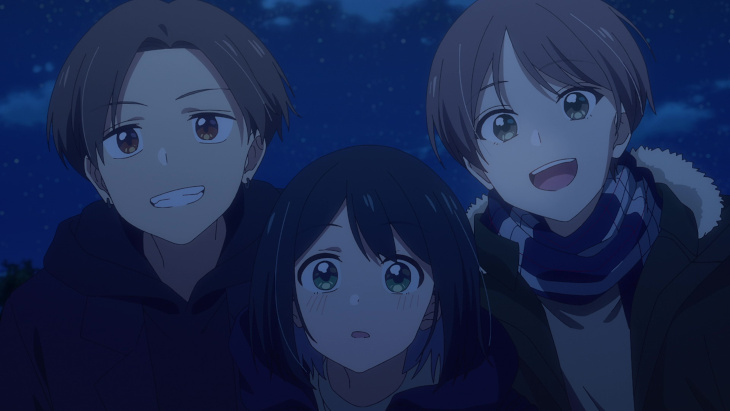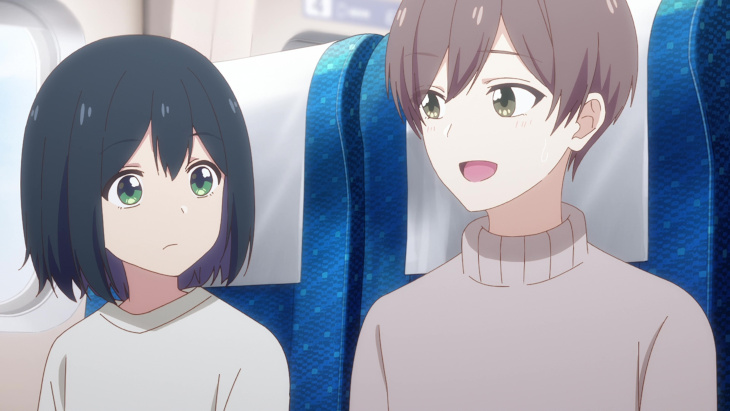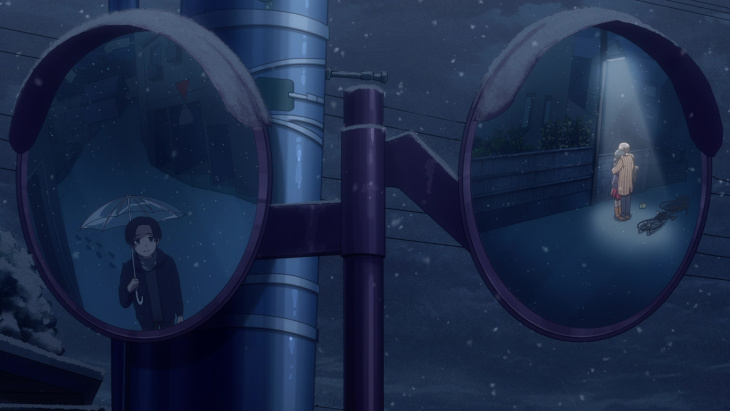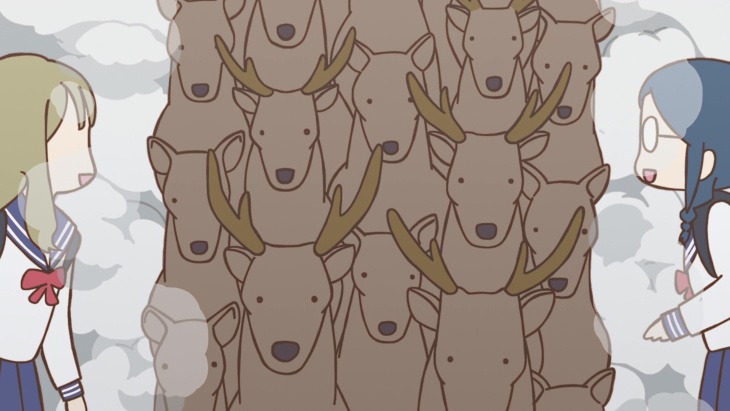
“Maybe I’m being selfish, but I don’t want to throw anything away. Not important people. Not important things. Not myself.”
Between moving right at the start of the season and a hurricane at the end of it, my anime viewing has been a bit inconsistent the past few months, and if there is a single show that suffered because of the irregular viewing, it’s Senpai wa Otokonoko. Despite its heavy subject matter, the show isn’t a hard watch, but it also doesn’t lend itself to marathoning. Even when a show takes care to make difficult subject matter palatable, so that it doesn’t wear out the audience, you still want to have some time to digest it. As a result, Senpai wa Otokonoko holds the position of being the show I found most impressive, and the one I had the most difficulty watching.
The irony is, the difficulty might be due to fear that I brought to the table, rather than anything the show did wrong. Given the sensitive nature of the topics at play, I was always on guard for a new depressing reveal or upset that would wreck the fragile emotional stability of these characters. I won’t go so far as to say that such moments don’t occur, but the show doesn’t rely heavily on them. Had I let go of that dread sooner, I think I’d have had a much more positive time with the first half. As it stands, Senpai wa Otokonoko is a show that not only tackles heavy subject matter, but steers directly into those elements without ever shedding its sense of optimism and good will. This one surprised me, and I think it is worth giving a chance.

The show follows a trio of high school students, all struggling with their own emotional hurdles. Makoto Hanaoka is a crossdressing student struggling with their sense of gender dysphoria, despite having a mother who is vehemently opposed to them straying from masculine gender norms. Saki Aoi is their underclassman who confessed to Makoto without being aware of their crossdressing, but is accepting of it anyway. However, Aoi is hiding deep seated attachment issues combined with a severe inferiority complex. Finally, there is Ryuji Taiga, Makoto’s childhood friend who’s secretly harbored a crush on them, but who is in constant turmoil over his own sexual identity.
When the show starts, it seems the narrative is mainly playing with interesting archetypes, albeit with limited depth. However, as the series progressed, I was repeatedly shocked to find hidden depths with each of the characters. As much as Senpai wa Otokonoko uses humor to mask its darker topics, it also refuses to take the easy way out. It avoids antagonists or two-dimensional strawmen, instead revealing underlying fears, insecurities, and even misdirected affection at the core of many of its characters’ unhealthier impulses. If there is a downside to this approach, it’s that sometimes its habit of wrapping up stories neatly can feel unrealistic, though a kinder term might be idealistic.

The show seems to use its comedy tactically. Part of it might be a cost saving measure, as the comedic moments revert to a very simplistic chibi-style. Still, that style works to highlight the humor and serve as a palate cleanser. If this show has a weakness, it’d be the tendency to rely on dramatic misinterpretations and misunderstandings, particularly on Makoto’s part. This is often the bread and butter of romantic comedy-dramas, but in a show with such strong character writing, this can feel like a stark contrast. Still, even those moments are short-lived.
While much of the writing is centered on the three main characters, the show consistently introduces new characters who bring new dimensions to our leads’ interpersonal relationships. Even in the last few episodes, the show introduces new classmates and family members with their own conflicts. What helps keep this engaging is that, of all the characters who bring some conflict to the dynamic, I can’t think of a single one for whom the motivation is direct hostility. Instead, one could argue insecurity is the ultimate antagonist of the show, and each of the characters works to defeat it in their own way. Also, while he suffers from the anime father disease where they’re almost never onscreen, Makoto’s dad still takes the award for best anime father. No contest.

Okay, having looked at the production information for this show, the tendency to rely on a simple chibi-style suddenly makes a lot of sense. I haven’t watched a ton of shows produced by Project No.9, but the few I’ve sampled have been low to mid-range comedies, like Love After World Domination or Pastel Memories. This is something of a departure from those works, and even if I can spot some cracks, I’m impressed at the level of quality throughout. As I said before, the purpose of the simplified comedy animation could be to cut costs, but the key factor is that it largely fits where it is used. Of the handful of shows I followed during the summer season, I think I might have liked the music from Senpai wa Otokonoko the best. That isn’t strong competition, but I enjoyed both the OP and ED, and even the background music has a pleasant, if simplistic, charm.
Before I wrap up, a few Notes and Nitpicks:
- It’s worth noting that, while the bullying largely isn’t depicted, Makoto is shown through flashbacks to have had a rough time once their class learned they weren’t born female.
- Seriously, Makoto’s father is only in a handful of scenes, but he is everything Makoto needs. I’d fully support a live action adaptation where he gets played by America’s dad, Pedro Pascal. Honestly, it was Makoto’s interactions with their father that clued me into the fact that the characters might have more going on under the hood than I initially expected.
- I was making that joke about how anime fathers are almost never around, or when they show up they’re unreliable deadbeats, but then I realized… Am I an anime protagonist!? Weird introspection aside, the show does deliberately play with a similar dynamic with one of the fathers, though unsurprisingly, it doesn’t treat it as a joke.
- I kept describing Senpai wa Otokonoko as a “deceptive” show, because I kept being startled by how gradually and unwittingly I had become emotionally invested in the characters.
- In the past, I’ve criticized shows such as spring’s Whisper Me a Love Song (They still haven’t finished airing that show, have they?) for their tendency to sidestep the societal issues present for individuals who are not part of the traditional gender-binary or involved in heteronormative behavior. It both creates a cognitive dissonance, and seems like it’s probably bypassing an important part of visibility for people among those demographics.
- I’m strangely relieved that none of the releases at the start of this season interested me enough to make me seriously consider leaving this review unfinished.
Senpai wa Otokonoko is the type of show that I’m glad I chose to review. Had I not decided to review it, this would have likely joined the legion of other series that I simply didn’t get around to finishing because I had other things going on. Viewers’ mileage may vary, but this show surprised me, and while the resolution is a little lacking, (It’s getting a film.) I think it is worth experiencing.




Add comment